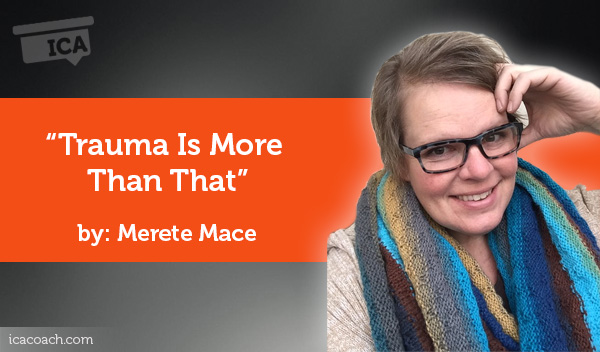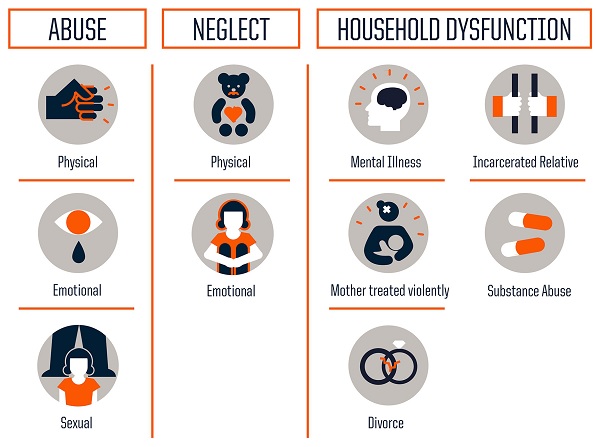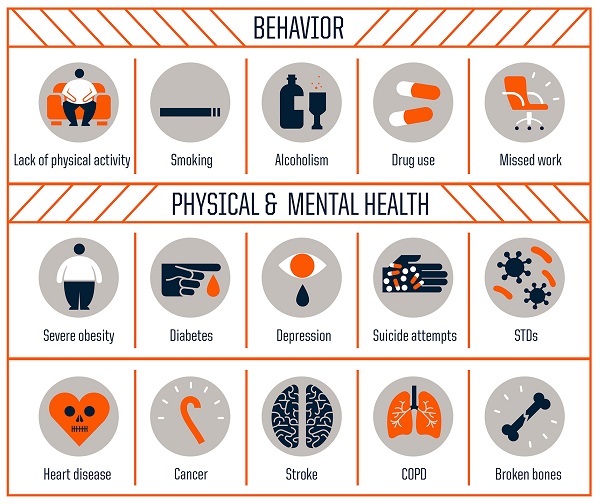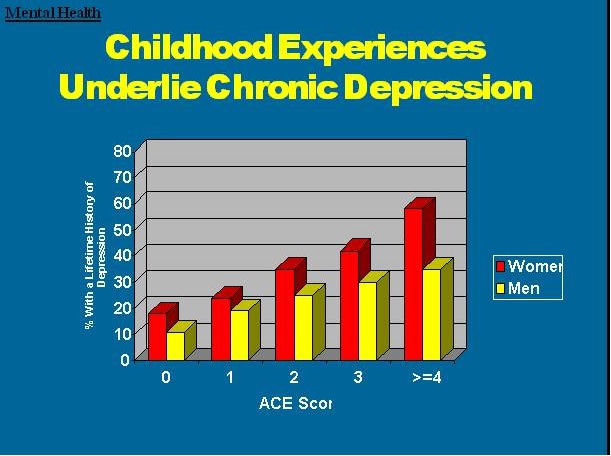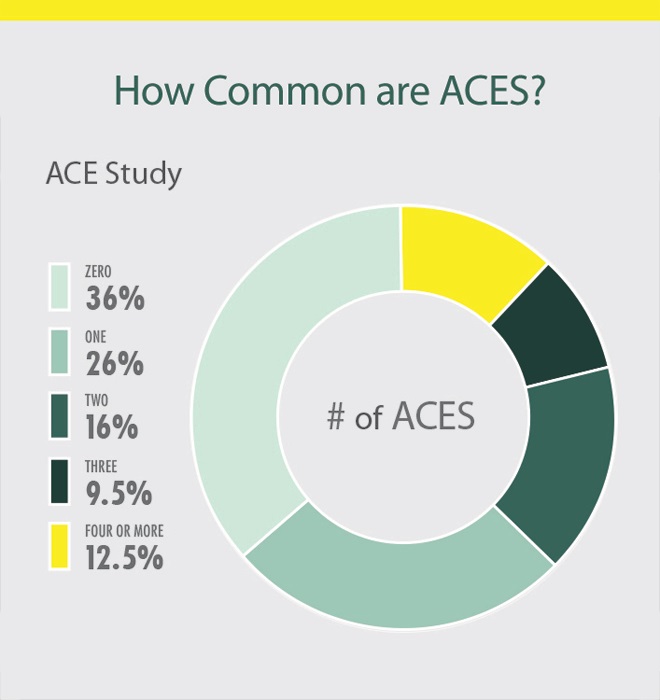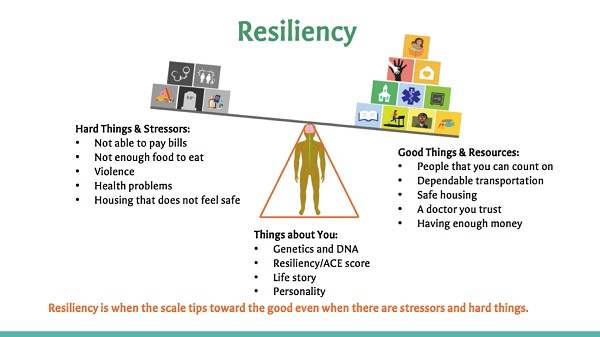Research Paper By Merete Mace
(Trauma Recovery Coach, UNITED STATES)
Unlike other forms of psychological disorders, the core issue in trauma is reality.1
I often get blank states when I tell people I’m a trauma recovery coach. Yes, it is a relatively new kind of coach, but I’m not sure people even make it to the recovery- or coach- part. They get stuck on trauma. What is that?
When using the word trauma, most people think abuse, natural dissenters or a really bad car accident. Horrible images from movies or news reports might go through our minds. For most, trauma seems far removed from their families and lives, they are thankful that they haven’t experiences trauma.
What comes to your mind when you think of trauma?
I believe that trauma is more than those horrible events mentioned and it is far more common then we think. Trauma can be in ordinary life situations and affect us in ways that we have no clue about.
So for this paper, I set out to scratch the surface of the meaning of trauma, it affects and how more awareness around trauma might benefit you.
Meaning of trauma
Definitions of trauma:
A disordered psychic or behavioural state resulting from severe mental or emotional stress or physical injury2
A deeply distressing or disturbing experience3
Psychological, emotional response to an event or an experience that is deeply distressing or disturbing4
The word trauma is actually Greek and it means wound. Well, wounds come in all sizes and often will result in a scar. Even with the best of care, most wounds will leave a mark. The same is true for trauma. Trauma comes in all sizes. Yes, it is absolutely the abuse, the horrible accidents, natural disasters. But it is much more than that. It’s things that don’t make it onto the news, things much closer to our lives and families. Trauma can also be bullying, losing a family member, divorce, losing a job, losing a pet, even seeing someone else get hurt. Little things that might not seem significant in the grand scheme of things but they do leave a mark.
Trauma and it’s effects are on a wide spectrum and not only that, but it’s also personal. Something that may be traumatic to me, might not to you.
The level of or significance of trauma is not defined by the situation or event that’s happening. It is defined by the person experiencing it. We experience everything through our own filters and our brain will try to match it with something already experienced, thus our perception of a situation becomes unique to us.
Based on our inner composition and stored experiences we make meaning and determine our level of resilience and ability to cope.
Trauma is when we have encountered an out of control, frightening experience that has disconnected us from all sense of resourcefulness or safety or coping or love5
The effects of trauma
Trauma is not just an event that took place sometime in the past: it is also the imprint left by the experience on mind, brain and Body6
The way our bodies and brains respond to trauma has become known as the toxic stress responds. Very simply put it’s the stress response of releasing cortisol and adrenaline into our system in a threatening situation, which is helpful if we are being chased by a bear. If we are not and in particular it happens repeatably and the chemicals don’t get a chance to again subside from our system, it’s toxic stress responds. Toxic stress is what affects us long after the bear is gone.
Children are especially sensitive to toxic stress because their bodies and brains are still developing.
The effects of trauma consist of a very long list of psychological symptoms. A diagnosis like Post Traumatic Stress Disorder, Generalized Anxiety Disorder or Dissociative Identity Disorder is often connected to past trauma.
There is ongoing research on trauma’s biological effect on the brain. So far we know that trauma causes alterations to the limbic system, the Hypothalamic–pituitary system and neurotransmitters.
In this paper, I will focus on the psychosomatic effects of trauma. Most people have an understanding of how trauma may cause psychological issues, but the fact that trauma is closely related to somatic and social issues is far less known.
The ACE study
ACE stands for Adverse Childhood Experiences. The ACE study initially took place in California in 1995 and 1997. Research data was collected from 17000 participating individuals. This makes the ACE study one of the largest studies done on the connection between childhood experiences and adult physical and emotional issues.
The study took place at Kaiser Permanente in San Diego and was initiated by Dr Vincent Felitti.
The participants were predominantly white middle-class people, with college educations and jobs that provided them health care – hence they were members of Kaiser Permanente.
It is important to notice the demographics of the participants in the ACE study, to realize as Dr Robert Anda who worked with Dr Felitti, said It’s not just ‘them’. It’s us.7
The survey results clearly showed a direct link between trauma before the age of 18 and adult chronic disease, mental illness and social issues.
Furthermore, it became clear that one kind of trauma often didn’t happen in isolation. And that there was a correlation between the number of different traumatic experiences in childhood and the level of risk of chronic disease and mental illness in adulthood.
After these findings, the researches developed a questionnaire to determine the ACE score. There were many different childhood traumas reported by the participants but the questionnaire asks the top 10 forms of trauma. 5 are personal about neglect or abuse and the other 5 are related to family members and household challenges.
Source: Centers for Disease Control and Prevention
If one of these traumatic experiences were present in a person childhood, the ACE score would be 1, if two were present the score would be 2 and so forth.
The results from the ACE study were astonishing and too wast to relay in this paper. Two-thirds of the participants had at least a score of 1 and 87% of those had more than 1. But the connection was clear between trauma in childhood and the risk of negative health outcomes. The following illustration shows the most common outcomes.
Source: Centers for Disease Control and Prevention
With an ACE score 1, your risk of illnesses such as Cancer, heart disease and depression goes up. As your ACE score goes up so does the risks. Looking through the data it is clear that the higher the ACE score the higher the risk is across the board. And the curves rise significantly. For example for a person with an ACE score of 4 or higher:
The likelihood of chronic pulmonary lung disease increases 390 per cent; hepatitis, 240 per cent; depression 460 per cent; attempted suicide, 1,220 per cent. 8
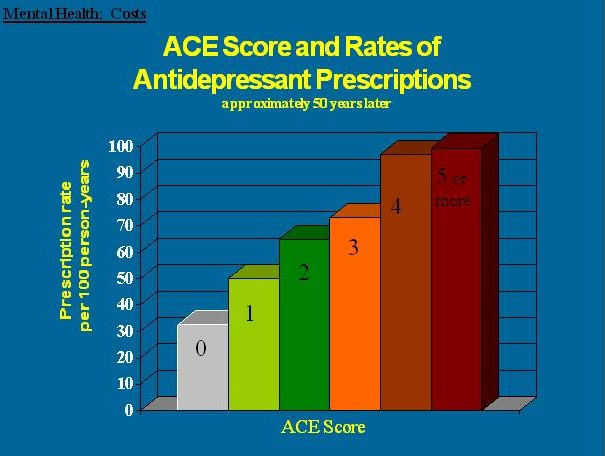
The Behavioral Risk Factor Surveillance System (BRFSS) was developed. It’s a yearly phone survey on health-related issues. Today the BRFSS collects date from 400.000 people from all 50 states. In addition, the BRFSS’s staff is aiding other countries to develop similar systems.
The data collected by the BRFSS confirms the findings from the original ACE study.
The ACE questionnaire can be found here: https://acestoohigh.com/got-your-ace-score/
Awareness around trauma
So why should I concern myself with trauma and it’s affecting? It is far more common than we realize. This is from the original ACE study and answers just that question:
We are gonna encounter people who have experienced trauma everywhere – work, school, the grocery store, or maybe your own bathroom mirror. It really puts those quotes on social media about not judging others because you don’t know what they are going through in perspective.
As coaches, we need to be even more aware. According to the ACE study, 64% of the people we work with will have experienced trauma, 38% have more than one form of trauma in their pasts. Chances are that those numbers are higher in the demographic of people seeking out coaching.
Trauma is perhaps the most avoided, ignored, belittled, denied, misunderstood, and untreated cause of human suffering9
I agree with Peter Levine here. And when you connect that with the knowledge gained from the ACE study, it becomes alarmingly important. So what can be done?
Resilience
Resilience is the ability to cope and adapt, to bounce back from events in life. As I mentioned earlier Trauma is personal and so is resilience. But what builds resilience? The single most important factor is the human connection. Growing up with just one secure relationship to a stable adult caregiver makes a world of difference to the child’s resilience and development. At any point or event in life family and friends are crucial to our ability to cope and adapt. Many other factors come into play. This illustration mentions some of them:
Resilience Score
In 2013 the Southern Kennebec Healthy Start group developed the Resilience Score questionnaire. It’s based on research studies and literature collected through many years on which childhood experiences make us resilient in life. It was meant to prompt awareness and dialogue in the light of the ACE study findings, not as a scientific tool. It does raise valid awareness of what creates resilience in human beings and focuses on the innate ability to survive and thrive under less than perfect conditions.
The questionnaire can be found here: https://acestoohigh.com/got-your-ace-score/
Resilience is made up of many different protective factors and although these are different for each of us. True for all of us is that awareness and understanding are key. Becoming aware of who you are and what you carry with you is the first step, then you learn to understand what you need.
Thankfully many practices that are commonly known and used in our world today are great tools for building resilience, such as mindfulness, yoga, journal writing and meditation.
Traumatic symptoms are not caused by the “triggering” event itself. They stem from the frozen residue of energy that had not been resolved or discharged; this residue remains trapped in the nervous system where it can wreak havoc on our bodies and spirit.10
My Conclusion
This paper truly is just scratching the surface of the significance of trauma awareness, but I believe we, as coaches, need a better understanding of trauma.
Trauma is a lot more than what makes it onto the news, it’s in the normal lives of 2 thirds of Americans.
The Ace study makes it clear that trauma is common for the average American, there’s a direct link between trauma and adult health issues, the majority of people experience more than one kind of trauma and with that increased risks.
The other direct connection is to resilience. While diagnosing or treating mental illness is not within the scope of coaching, walking with people in whatever they are going through is. Building resilience, creating awareness and understanding resonates with coaching.
Resources
www.cdc.gov
https://acestoohigh.com
www.merriam-webster.com
www.psychologytoday.com
https://centerforanxietydisorders.com
www.tarabrach.com
www.google.com
www.ncbi.nlm.nih.gov
Peter Levine: Healing Trauma: A Pioneering Program for Restoring the Wisdom of Your Body
Peter Levine: In an Unspoken Voice: How the Body Releases Trauma and Restores
Goodness
Peter Levine: Waking the Tiger: Healing Trauma
Bessel Van der Kolk: The body keeps the score
Pete Walker: Complex PTSD
Laura van Dernoot Lipsky: Trauma Stewardship
Laurence Heller: Healing Developmental Trauma
